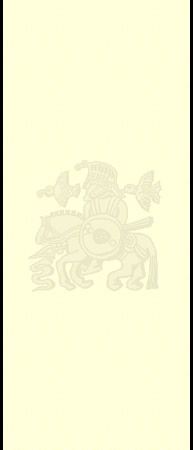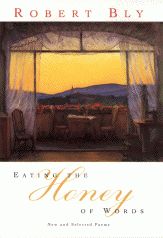



| Web site design and maintenance by Akikaze Media Services. All content of this site, unless otherwise noted, is copyright ©2001 Robert Bly. All Rights Reserved. Any duplication, in any form without the written consent of the copyright holder is prohibited. |

A New and Selected volume allows readers an overview of a poet’s career, presenting a representative selection of his work and giving an entry-point to the wider oeuvre. It has the function, too, of summing a career. Robert Bly’s recent Eating the Honey of Words is a substantial and attractive book. It will probably introduce many new readers to his work, but it presents a very specific view of Bly’s career, emphasizing some aspects and ignoring (even editing-out) others.
When I interviewed Bly late in 1977 (parts of this interview have been published in Dharma Life 7, April 1998 and Urthona 11, Spring 1999), I questioned him about the changes of opinion and value evident through his career–especially the shift from the archetype of the mother to that of the father between Sleepers Joining Hands (1973) and the prose book Iron John (1990). He replied, laughing:
That’s quite right. That’s quite right. I’m partly exhibitionist. But someone else said, "Robert, the only thing I like about you is that you educate yourself in public."
I cite this exchange because it seems to have a bearing upon Eating the Honey of Words. Its relevance lies in the many revisions from the original published versions of poems and in the re-visioning of Bly’s career implied in the text’s arrangement. A number of poems have slipped across the boundaries of the volumes in which they were originally published and appear now under the headings of earlier or later books. There is, one suspects, something of Bly educating himself in public in these rearrangements and revisions, as the tone and meaning of some early poems have shifted, sometimes quite significantly. A telling example of this is the poem "Unrest," which appeared in Bly’s first volume, Silence in the Snowy Fields (1962). The poem originally concluded:
We are returning now to the snowy trees
And the depth of the darkness buried in snow, through which you
rode all night
With stiff hands; now the darkness is falling
In which we sleep and awake–a darkness in which
Thieves shudder, and the insane have a hunger for snow,
In which bankers dream of being buried by black stones,
And businessmen fall on their knees in the dungeons of sleep.
Now it reads:
We are returning now to the snowy trees,
Charlemagne, through which you rode all night
With stiff hands. Now
The darkness is falling, in which we sleep
And wake, a darkness in which thieves shudder
And the insane have a hunger for snow,
And stiff-faced men like me
Fall on their knees in the dungeons of sleep.
Besides noting that the lineation of the edited poem works more effectively than the earlier version, and that the revision gives the final two lines a pleasingly motive internal rhyme, we also recognize that Bly has inserted himself in the poem. Whereas the version from Silence in the Snowy Fields loads itself on the anonymous open signifiers of "businessmen" and "bankers," in the later version Bly recognizes that he himself embodies the qualities and the failings he earlier sought to project onto these cultural stereotypes. This example demonstrates the older Bly coming to question some of his own younger attitudes and pronouncements. Indeed, in our interview he went on to say that the danger with learning about life in such a public way is that "there’s a lot of error and there’s a lot of false statements I’ve made."
Bly’s poems tend to fall more or less easily into several categories. There are poems of wilderness and solitude; domestic poems–one might call these hearth poems to further underline the distinction from the poems of the first category; love poems (of wilderness and hearth); "political" poems; philosophic and didactic poems in which Bly embodies some of the teachings of his prose books; and several more categories beside. Although there are a number of interesting poems in the earlier parts of Eating the Honey of Words, as the book progresses chronologically, real depth begins to replace tendencies toward superficial surrealist diction and political and worldly opinionatedness. In terms of the categories suggested, there is more philosophy in the later poems–a marked influence of ideas and images from world religions, especially Sufism and Christianity–and the politics are of an older man, better thought-through and more empirical; the love poems too become more appealingly easeful.
So, although there are a few outstanding poems here from Silence in the Snowy Fields (in the section named for that book and under the title "Early Poems"), I found my pleasure and my confidence in Bly’s abilities as a poet increasing as I read through the book.
An example from Silence in the Snowy Fields is "Poem in Three Parts," the first part of which exhibits an exuberant joy recalling Whitman:
Oh, on an early morning I think I shall live forever!
I am wrapped in my joyful flesh,
As the grass is wrapped in its clouds of green.
It is the book’s second half, from the poems of Loving a Woman in Two Worlds (dated here 1973-81), that we find his most mature and pleasing work. In particular the Morning Poems surprise and delight in their resonant ease. Following William Stafford’s practice of writing every morning, Bly remained in bed until he had completed a poem. Unspectacular in their imagery, familiar and accessible in their language, the large section of these poems, like Stafford’s work, speaks the world with clarity and simplicity. These poems include evocative, sensual descriptions:
It’s morning. The brown scoops of coffee, the wasplike
Coffee grinder, the neighbors still asleep.
The gray light as you pour gleaming water–
It seems you’ve traveled years to get here.
Sometimes they are quirky, as in "What the Buttocks Think" and "A Conversation with a Mouse," sometimes melancholy ("My Doubts on Going to Visit a New Friend").
All writers revise their work. Robert Lowell is well known for his compulsive editing and re-writing. Elizabeth Bishop fretted over poems for years–an example being "The Moose," which she is reported to have worked at for twenty-five years before it appeared in the New Yorker, and which she revised again before publishing it in a book. It is perhaps exactly because they appear in a volume intended to sum a career that the revisions in Eating the Honey of Words seem so striking. Perhaps I overemphasize this point, but I feel it affected my reading of the book; I found myself stopping and seeking out the original versions of poems published in earlier volumes because the poems here didn’t square with my memory. And while in some instances the revisions quite clearly improve the poem, one still wonders at the witness of a New and Selected that so reshapes the record of a poet’s career.
—Ian Tromp, PN Review, Sept./Oct. 1999